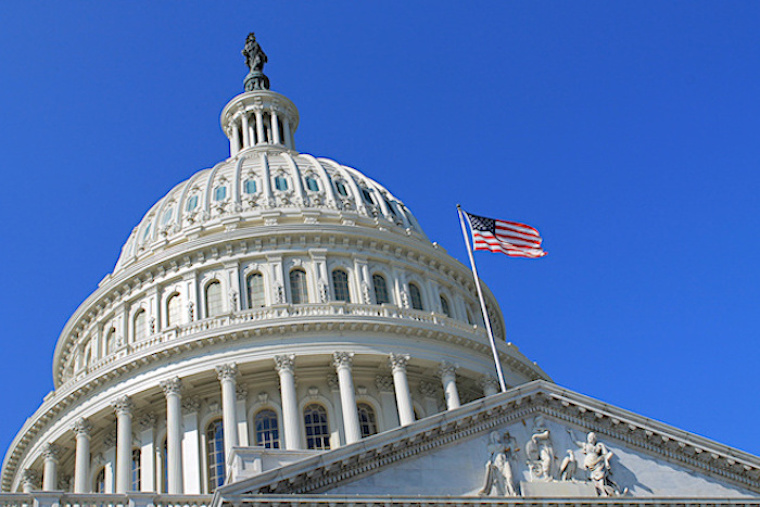
WASHINGTON (States Newsroom) — U.S. House Republicans on Tuesday kicked off their work to build consensus on “one big, beautiful bill,” to fund President Donald Trump’s priorities, including a major funding boost for immigration enforcement and border security.
After returning from a two-week recess, House lawmakers started debating and amending the various sections of the bill with markups in the Armed Services, Education and Workforce, and Homeland Security committees.
Congressional Republicans are using reconciliation — a special procedure that skirts the Senate’s 60-vote filibuster — to put together one bill to fulfill the White House’s priorities on border security, tax cuts, energy policy and defense.
The Homeland panel’s bill, which would increase funding for border security by $70 billion, aligns with Trump’s second-term agenda, which has centered on an immigration crackdown.
The Homeland Security portion of the reconciliation package recommends $46.5 billion to construct a barrier along U.S. borders and $5 billion for Customs and Border Protection facilities, including $4.1 billion to hire 3,000 Border Patrol agents and 5,000 CBP officers. It would also set aside $2 billion for retention and signing bonuses for CBP staff.
“It is critical that the Republican majority do what the people elected us to do, approve funds for effective border security and enforcement measures,” House Homeland Security Chairman Mark Green of Tennessee said.
The bill also includes $2.7 billion in technology surveillance along U.S. borders and roughly $1 billion for inspection technology at ports of entry.
The top Democrat on the committee, Rep. Bennie Thompson of Mississippi, said Democrats were unified in their opposition to the proposal. He argued that roughly $70 billion in funding would only aid the Trump administration in its plans of mass deportation and not address border security.
“House Republican leadership is putting lipstick on this pig of a reconciliation package by pretending it’s about border security,” Thompson said.
Votes on all three committees’ bills, and amendments mostly from Democrats raising objections to the package, were expected late Tuesday or after midnight Wednesday. The committees are not expected to adopt any of the Democratic amendments.
Summer floor votes
Speaker Mike Johnson, R-La., said Tuesday he expects the House will spend the rest of this week and next week debating the 11 different bills in committee before rolling them all into one reconciliation package.
The full House will debate and vote to approve the legislation before Memorial Day, under the current timeline.
“I don’t know how long the Senate is going to take to do their piece,” Johnson said. “But I was very encouraged after the meeting yesterday, frankly. Leader (John) Thune and Sen. (Mike) Crapo are on point. The Senate Republicans have been working very hard together.”
Thune, of South Dakota, is the Senate majority leader and Crapo, of Idaho, chairs the tax-writing Finance Committee.
Treasury Secretary Scott Bessent has said the administration would like the package to clear Congress before the Fourth of July, though Johnson said he “hopes” to finalize a deal before that deadline.
Thune said later Tuesday that the reconciliation package’s final look will be decided by what policies have the votes to get through each chamber.
“Ultimately, what gets included in a reconciliation bill will be determined by what there are 218 votes for in the House and 51, or 50, votes for in the United States Senate,” Thune said.
Democrats object to deportations
Democrats on the Homeland Security panel introduced amendments to signal their opposition to the administration’s deportation agenda.
Louisiana Rep. Troy Carter was one of several Democrats to sharply criticize the recent deportation of three U.S. citizen children to Honduras during the Homeland Security Committee’s markup.
He noted that one of the children removed with his mother to Honduras, is a 4-year-old battling Stage 4 cancer.
“This is not border security,” Carter said. “This is state-sanctioned trauma.
Democrats introduced amendments to bar federal funds being used to detain immigrants at a foreign prison, following an agreement between the U.S. and El Salvador to detain more than 300 men in a notorious mega-prison. Experts have raised concerns the agreement could violate a law against funding foreign governments engaged in human rights abuses.
“This is not an idle possibility,” Democratic Rep. Seth Magaziner of Rhode Island said.
He pointed out that Trump asked El Salvador’s president Nayib Bukele to consider taking “homegrown” criminals, meaning U.S. citizens.
“This is insane,” Magaziner said. “It is outrageous and every American should be terrified by this prospect.”
Several other Democrats introduced amendments related to the Trump administration’s use of the prison in El Salvador.
Boost for Pentagon
The House Armed Services Committee portion of the reconciliation package would bolster defense spending by $150 billion over the next decade.
That funding would be divvied up between numerous national security priorities, including $25 billion for Trump’s goal of having a countrywide missile defense system, similar to Israel’s Iron Dome.
The defense bill would appropriate $34 billion for shipbuilding and the maritime industrial base, $21 billion for munitions purchases, $14 billion for “initiatives to scale production of game changing new technology,” $13 billion for nuclear deterrence and $12 billion to enhance military readiness, according to a GOP summary of that bill.
Chairman Mike Rogers, R-Ala., said at the beginning of his committee’s markup that the bill would make a “generational investment in our national security.”
“It is clear we are no longer deterring our adversaries,” Rogers said. “The threats we face today from China, Russia, Iran and North Korea and others, are much more serious and challenging than we have ever faced before.”
Washington Democratic Rep. Adam Smith, ranking member on the panel, said there’s “no question that the Department of Defense has needs and there’s also no question that we as a country face threats.”
But Smith criticized Republicans for moving the defense funding boost within the massive reconciliation package, which will increase the deficit.
“We’re, once again, saying to the American people, ‘This is important but not important enough to actually pay for it.’ So the budget itself is a huge problem,” Smith said. “And you really can’t support the additional $150 billion for defense if you don’t support the overall reconciliation bill because that’s what this is. And the overall reconciliation bill, I firmly believe, is a disaster for this country.”
Smith criticized Republicans for proposing additional dollars for the Pentagon while it is run by Defense Secretary Pete Hegseth, who is under investigation for sending information about a bombing campaign in Yemen to a group chat that inadvertently included a journalist and a different group chat that included his wife, brother and others.
“They have not even begun to prove that there is a chance in hell that they will spend this money intelligently, efficiently and effectively,” Smith said. “Secretary Hegseth has proven himself to be completely incapable of doing the job of secretary of Defense.”
Cuts for Pell grants
The Education and Workforce Committee’s markup fell along similar partisan lines, with GOP lawmakers lauding the bill and Democrats rejecting Republicans’ plans seeking to overhaul federal spending.
Chairman Tim Walberg, R-Mich., said the legislation would cut $330 billion in federal spending over the next decade by reshaping federal student loan programs and Pell grants for low-income students, among several other changes.
“Dumping more federal money into a broken system doesn’t mean that system will work,” Walberg said. “In fact, government spending on higher education has reached record highs, yet millions of students benefiting from those funds will ultimately end up with a degree that doesn’t pay off or fail to finish school altogether.”
The GOP bill, he said, would “bring much-needed reform in three key areas: simplified loan repayment, streamlined student loan options, and accountability for students and taxpayers.”
Walberg scolded former President Joe Biden for not working with Congress to overhaul federal grant and loan programs for higher education, saying the former administration “was determined to keep pouring taxpayer funds into the abyss in a futile attempt to keep up with the unacceptable and unaccountable institutional prices.”
Virginia Democratic Rep. Bobby Scott, ranking member, said that Congress should look at ways to make college more affordable through reforms, but said the GOP bill “misses the mark.”
“This current reconciliation plan would increase costs for colleges and students. It would limit students access to quality programs, which would then reduce their likelihood of finding a rewarding or successful career,” Scott said. “And then take the so-called savings to pay for more tax cuts for the wealthy and the well-connected.”
Republicans “limiting the students’ access to Pell grants and federal loans,” he said, could increase the number of people who have to rely on “predatory, private loans” to pay for college.
“Put bluntly: The Republican plan will limit how much money middle- and low-income students can borrow from the federal government,” Scott said. “As a result, limiting the federal student aid that students can receive means that millions of students will not be able to access federal assistance that they need to complete their degrees. Moreover, this bill will force student borrowers into unaffordable repayment plans.”







